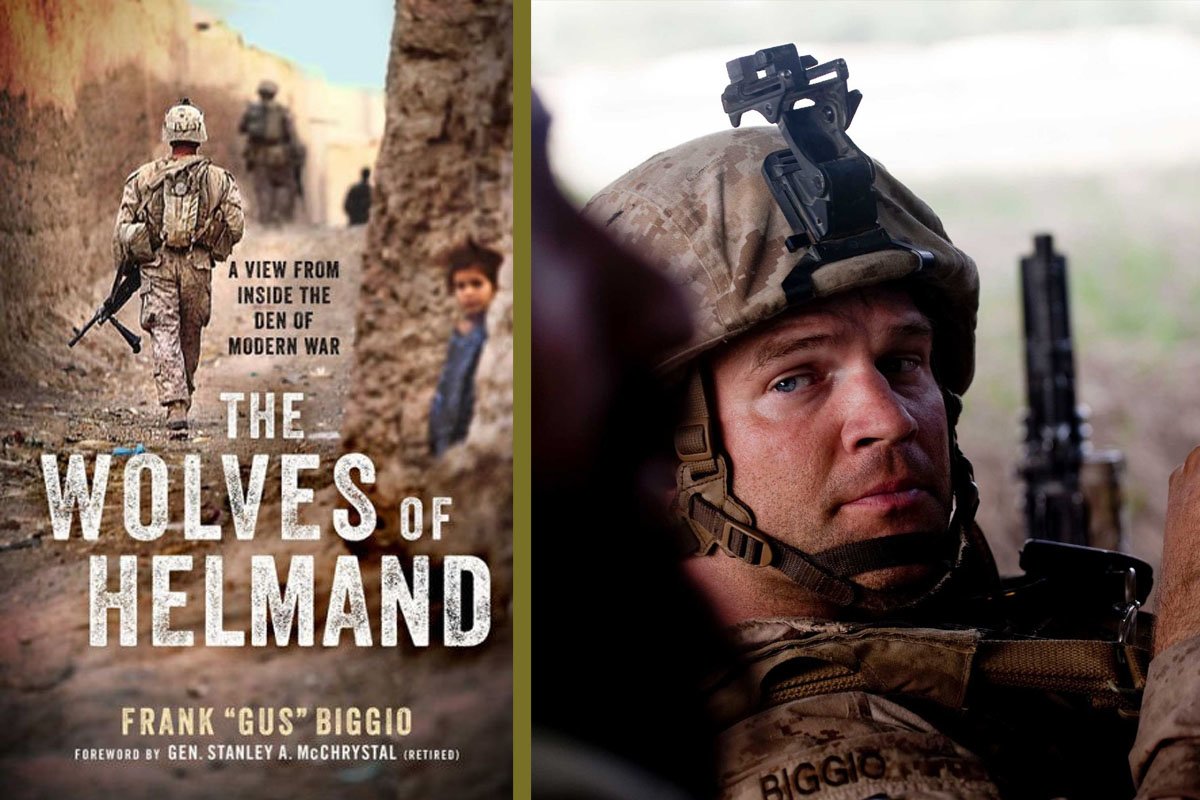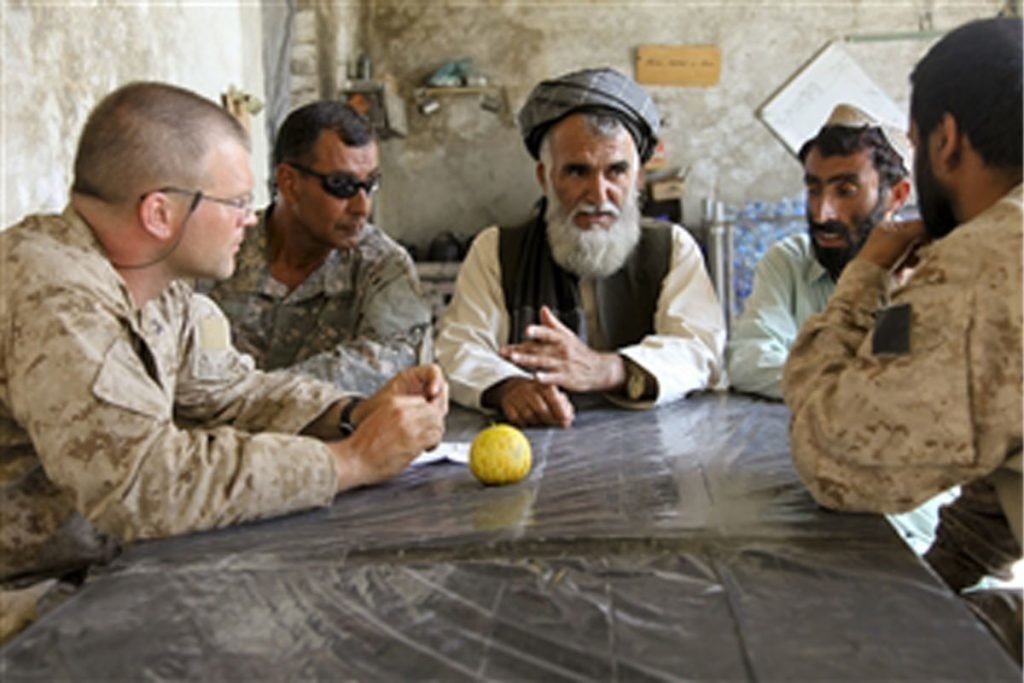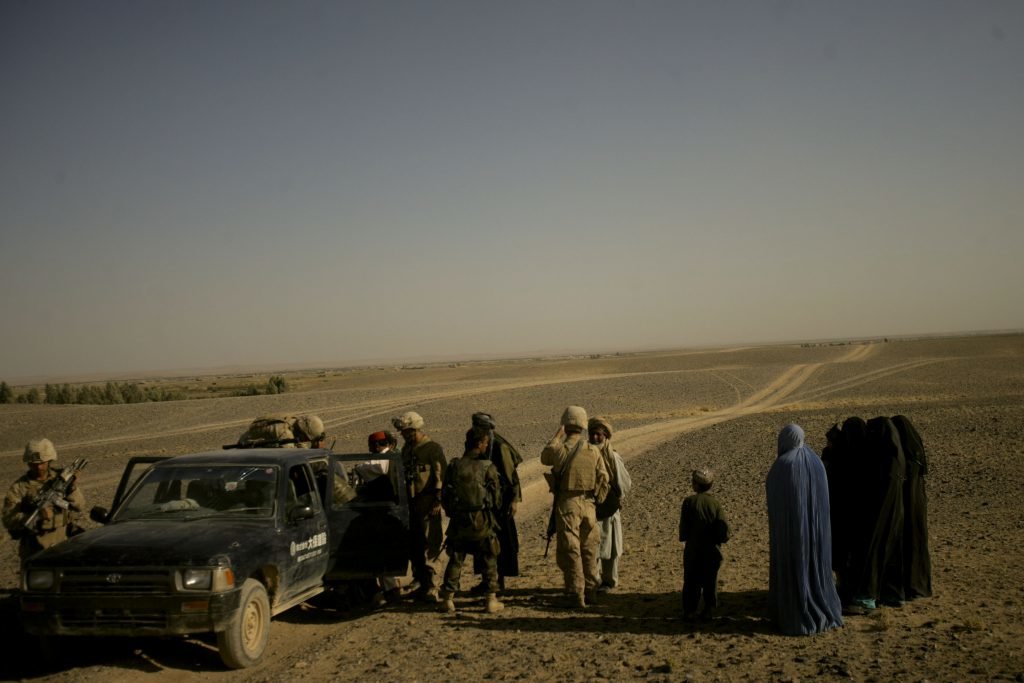Review: In ‘The Wolves of Helmand,’ a Devil Dog Dances with Wolves in Afghanistan

Heads up, from the author himself:
“Although this book is about our time at war, readers should not expect a nail-biting, shoot ’em up thriller.”
With that accurate tip, Gus Biggio — “Jagras Gus” in Pashto — presents The Wolves of Helmand: A View from Inside the Den of Modern War, a memoir about seven months as a captain in a Civil Affairs Group supporting 1st Battalion, 5th Marine Regiment (1/5), in Helmand province in 2009.
His salute to service in the Marine Corps consists of 33 brief chapters plus a foreword by retired Army Gen. Stanley A. McChrystal, who refers to Biggio as “one of the American heroes who helped turn the tide of the war.”
In Biggio’s own nod to counterinsurgency (COIN) tide, he offers a hats off to four translators.

“Effective COIN operations depend on winning over the trust of the local population,” he says. “Without our interpreters this [success] could never have happened.”
Another “covers off” is to four 1/5 Marines who are killed that summer and fall in Afghanistan. In war, “bad things will happen to good people,” and the four are “some of the absolute best of those good people.”
And another chapter — the most evocative — also departs from the deployment storyline.
In “What It’s Like to Go to War” Biggio responds internally to a query from a civilian at a “trendy” restaurant when he returns home. Oddly, the text does not mention the similarly titled and superb 2011 book by Vietnam veteran Karl Marlantes, also a Marine.
As Biggio ruminates about how to answer the question, he presents combat situations that alternately dare and dumbfound a Marine. He does so with sensitivity and emotional fragility not always present in the rest of the book.
In essay style, he offers a litany from excitement to boredom, from guilt (could he save an Afghan man “writhing in agony after being shot in the guts”?) to physicality (“the heft of a loaded pistol on my thigh relaxed me”).

Also, he mentions confidence (“I looked at my fellow Marines with awe and humility, knowing they would have my back when the shit went down”) and unselfishness (combat “requires absolute dedication to a collective effort more significant than anything we would ever confront in our own lives”). And some things he is unable to understand, even for himself (“being lonely even though you are never ever by yourself”).
His final answer at the eatery?
“It’s kind of hard to explain,” he replies. “I guess you just had to be there.”
Being there is what drives Biggio, who was in the Corps from 1993 to 1997, to join the Marine Corps Reserve in 2007. “This will count as your midlife crisis,” his wife says.
A motivated stickler, he spells “oorah” with another “h” (“hoorah”), and in law school he knows “I would always think of myself as a Marine before I’d ever think of myself as a lawyer.”
His affinity for the Corps inspires and permeates the pages. He endorses his chosen “special tribe” and notes an instance in which “40 young men who were loaded up with testosterone and firepower” head out on a mission “into the quasi-medieval terrain of the district we had come from the other side of the world to protect.”

To protect even when being lied to.
In his Civil Affairs role, Biggio distributes money for civic projects and as compensation for damages. “Paying these claims showed that Marines are as magnanimous as they are lethal,” he says.
But one request gets his goat. A Nawa District farmer claims Marines killed his cow, and he offers a withered tail as proof of carcass.
Biggio asks: “What happened to the rest of the cow?”
“The wolves ate it.”
There are no wolves in Helmand, Biggio replies, and the farmer leaves empty-handed — but the captain gets a title for his book.
A bonus in this reminiscence is “Corps Quotes: Things People Say in a War Zone.” Most of the 65 quotations over 12 pages in the back of the book are so memorable you wonder whether the author considered using the words within the main narrative.
For example, and for your enjoyment:
- A Marine on latrine-burning duty: “You’ve got to constantly stir it; otherwise the diesel fuel makes a crusty layer on top and the stuff underneath stays all gooey. Kind of like a crème brulee, but not one you’d want to eat.”
- A senior enlisted Marine to a junior NCO: “If you’re going to try to be a smart ass, make sure you’re smart. Otherwise, you’re just an ass.”
- A sergeant explaining why he carries no good-luck charms: “It’s bad luck to be superstitious.”
The Wolves of Helmand: A View from Inside the Den of Modern War by Frank “Gus” Biggio, Forefront, 288 pages, $26, available Nov. 10, 2020.

J. Ford Huffman has reviewed 400-plus books published during the Iraq and Afghanistan war era, mainly for Military Times, and he received the Military Reporters and Editors (MRE) 2018 award for commentary. He co-edited Marine Corps University Press’ The End of Don’t Ask, Don’t Tell (2012). When he is not reading a book or editing words or art, he is usually running, albeit slowly. So far: 48 marathons, including 15 Marine Corps races. Not that he keeps count. Huffman serves on the board of Student Veterans of America and the artist council of Armed Services Arts Partnership and has co-edited two ASAP anthologies. As a content and visual editor, he has advised newsrooms from Defense News to Dubai to Delhi and back.
BRCC and Bad Moon Print Press team up for an exclusive, limited-edition T-shirt design!
BRCC partners with Team Room Design for an exclusive T-shirt release!
Thirty Seconds Out has partnered with BRCC for an exclusive shirt design invoking the God of Winter.
Lucas O'Hara of Grizzly Forge has teamed up with BRCC for a badass, exclusive Shirt Club T-shirt design featuring his most popular knife and tiomahawk.
Coffee or Die sits down with one of the graphic designers behind Black Rifle Coffee's signature look and vibe.
Biden will award the Medal of Honor to a Vietnam War Army helicopter pilot who risked his life to save a reconnaissance team from almost certain death.
Ever wonder how much Jack Mandaville would f*ck sh*t up if he went back in time? The American Revolution didn't even see him coming.
A nearly 200-year-old West Point time capsule that at first appeared to yield little more than dust contains hidden treasure, the US Military Academy said.












